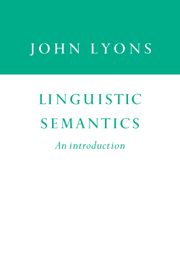Book contents
- Frontmatter
- Contents
- Preface
- List of symbols and typographical conventions
- Part 1 Setting the scene
- Part 2 Lexical meaning
- Part 3 Sentence-meaning
- 5 Meaningful and meaningless sentences
- 6 Sentence-meaning and propositional content
- 7 The formalization of sentence-meaning
- Part 4 Utterance-meaning
- Suggestions for further reading
- Bibliography
- Index
5 - Meaningful and meaningless sentences
Published online by Cambridge University Press: 05 June 2012
- Frontmatter
- Contents
- Preface
- List of symbols and typographical conventions
- Part 1 Setting the scene
- Part 2 Lexical meaning
- Part 3 Sentence-meaning
- 5 Meaningful and meaningless sentences
- 6 Sentence-meaning and propositional content
- 7 The formalization of sentence-meaning
- Part 4 Utterance-meaning
- Suggestions for further reading
- Bibliography
- Index
Summary
INTRODUCTION
In the last three chapters we have been concerned with lexical semantics: i.e., with the meaning of lexemes. We now move on, in Part 3, to a consideration of the meaning of sentences.
The distinction between sentences and utterances was introduced in Chapter 1 (see 1.6). The need for drawing this distinction is reinforced by the discussion of grammaticality, acceptability and meaningfulness in the following section (5.1). But our main concern in this short, and relatively non-technical, chapter is the meaningfulness of sentences. Granted that some sentences are meaningful and others meaningless, what grounds do we have for drawing a theoretical distinction between these two classes of sentences? Is it a sharp distinction? Is there only one kind of meaningfulness?
What may be described as truth-based theories of the meaning of sentences have been particularly influential in modern times, initially in philosophical semantics, later in linguistic semantics. Two of these were mentioned in Chapter 1: the verificationist theory and the truth-conditional theory (1.7). According to the former, sentences are meaningful if (and only if) they have a determinate truth-value. In formulating the verificationist theory of meaning (or meaningfulness) in this way, I am temporarily neglecting to draw a distinction (as many verificationists did) not only between sentences and utterances, but also between propositions and propositional content, on the one hand, and between truth-values and truth-conditions, on the other.
- Type
- Chapter
- Information
- Linguistic SemanticsAn Introduction, pp. 131 - 152Publisher: Cambridge University PressPrint publication year: 1995



